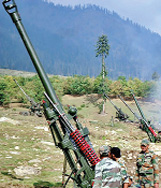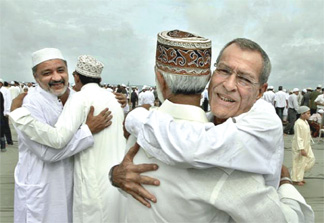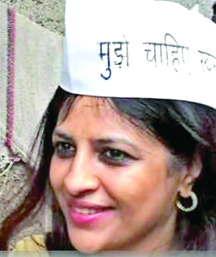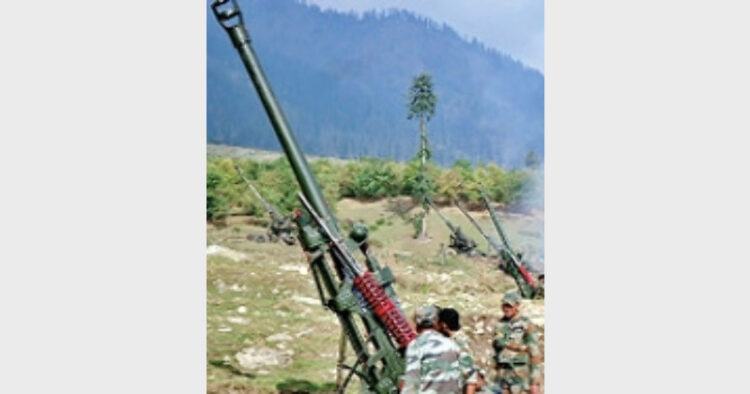?Tosa Maidan is a meadow in the Budgam district of the Kashmir valley. The area was leased out to the Indian army in 1964 for setting up an artillery range; and the lease has been extended a few times since then. Expiry of the current lease on April, 18, 2014; a demand for vacating the army from the firing range, and a high-level committee headed by Chief Secretary meeting this week to take a decision on the issue could not have come at a better time than when the country is witnessing 16th Lok Sabha elections.
To deal with the issue, the state and the army had decided to constitute a committee during a civil-military liaison conference held under the chairmanship of the Chief Minister of the state, in November 2013. In a recent meeting held by the committee at Jammu and presided over by Chief Secretary Mohammad Iqbal Kanday, the Army has reportedly expressed its willingness to explore alternate sites to relocate the field fire range. But the problem according to them lies in identifying a suitable location in the snow bound conditions in the higher reaches that is away from the residing population.
 Since, the army has undertaken a number of social initiatives to compensate for the inconvenience being caused to the people in Tosa Maidan. Over the years procedures have been put in place to ensure that no casualties take place during firing. The locals are informed in advance by both the government officials and the army representatives about a firing schedule, and it is ensured that the range is clear of human presence before the firing commences. Few deaths occurred when locals tried coming in the firing range to collect residual material of shells, as it fetches them a handsome price. The argument of environmental degradation also does not hold much merit because it is the army that’s stalled the process of deforestation by putting a stop to timber smuggling. Hence, the future of Tosa Maidan should not be decided on the basis of self-centered politics. Any decision made under such circumstances cannot be deemed to be in the interest of the people.
Since, the army has undertaken a number of social initiatives to compensate for the inconvenience being caused to the people in Tosa Maidan. Over the years procedures have been put in place to ensure that no casualties take place during firing. The locals are informed in advance by both the government officials and the army representatives about a firing schedule, and it is ensured that the range is clear of human presence before the firing commences. Few deaths occurred when locals tried coming in the firing range to collect residual material of shells, as it fetches them a handsome price. The argument of environmental degradation also does not hold much merit because it is the army that’s stalled the process of deforestation by putting a stop to timber smuggling. Hence, the future of Tosa Maidan should not be decided on the basis of self-centered politics. Any decision made under such circumstances cannot be deemed to be in the interest of the people.
The deployment of artillery in Tosa Maidan is an imperative security requirement. It should not be forgotten that it was the artillery that played a vital role in ensuring victory in the Kargil war. The artillery units posted in Kashmir use the Tosa Maidan firing range to calibrate their guns. The need to do so in-situ is dictated by the prohibitive cost and great effort required for transporting heavy artillery equipment by road from the valley to the bigger ranges in central India. And as, the over taxed Jammu-Srinagar highway cannot take the load of such large military movement, baseless politicising of the issue will not accrue any tangible results; and only a solution within the realm of practicality will work. For electoral gains, some members of the ruling coalition have begun making lose statements about the issue. The state finance minister Abdul Rahim Rather, in an election rally recently said that the government wouldn’t extend the lease; but no such decision has been said to be formally communicated to the army by the state government.
And now Tosa Maidan has become a political issue. It is being connected to revocation of Armed Forces Special Powers Act, de-militarisation etc., even when it has no relation with these issues. And the Hurriyat, doesn’t want to let go of this rabble-rousing opportunity. They are sending delegations to Tosa Maidan to garner support and are flooding the media with misinformation in their attempt to malign the army, and are said to continue it even if the lease is extended. They even have problem with the option of finding an alternate site for the field fire range. These days much is also being said about the huge tourism potential of Tosa Maidan. But does the State government have a concrete plan to build an infrastructure that can provide sustenance to people, if the army walks away? If so, why places more beautiful than Tosa Maidan havet not been developed as tourist destinations? Why for decades now, the tourism circuit has remained unchanged in the Kashmir valley, and how it can now be believed, an additional effort can be expected in the near future? And if not for tourism, then what exactly is Tosa Maidan’s worth in terms of economic activity? Will need an answer.
– Jaibans Singh
(The author is chief editor of an Indian defence and security related website www.defenceinfo.com)
?Nehruvian Secularism — A paradox
Sanatana Dharma, which means the eternal or universal tradition, is the ancient name for what we today call the Hindu religion. It refers to a dharma, a teaching that represents much more than just a religion; rather, it provides its followers with an entire worldview, way of life that represents a coherent and rational view of reality. For ages, Hindus followed this tradition and welcomed people from foreign shores, and gave them freedom to practice their religion to live in peace and harmony with the other communities.
In the past few years, the Indian republic has undergone many socio-economic changes, and has witnessed communal riots triggered by religious fanatics, but the doctrine of universal acceptance for mutual co-habitation among people of various religions, caste and creed still remains to be the unifying force that breathes life into this democratic state.
One may now ask, what are the characteristic qualities of Hindu culture? On the basis of what is practised in Hindu religion, our culture is based on love and tolerance, and believes in giving space to every religion to establish peace and happiness among communities.
When Parsees and Jews lost their nation, and became despondent, India received them with open heart, and gave them shelter. Today they enjoy stability, peace and happiness. But the Muslims still continue to be defiant, and have yet not been able to see themselves as a part of this nation.
During the British rule Macaulay tried to corrupt India culturally by bringing change in the education system, and promoting the use of English language. But the Indians adopted this language too, and the bright lights like Swami Vivekananda, Rabindranath Tagore and Salman Rushdie, are examples of legends whose literary work in the foreign language has been acclaimed globally.
Muslims in India – a paradox
 Historically, the Muslim leaders in India never tried to comprehend national realities that could help them live in togetherness with the Hindus and with the people belonging to other religions in our country. Despite having lived in India for long they have maintained their allegiance for the Mughal invaders, who destroyed Hindu temples and forcefully converted people into their religion, and have forgotten their parentage and century old ancestry and love for India where they earn they earn their bread and butter. Hamid Dalwai, the noted Muslims reformist thinker, who pondered deeply over the need for democratic policies for Indian Muslims says, Muslim leaders failed to align fully with the Hindus during freedom movement, and focused more on initiating policies of division.
Historically, the Muslim leaders in India never tried to comprehend national realities that could help them live in togetherness with the Hindus and with the people belonging to other religions in our country. Despite having lived in India for long they have maintained their allegiance for the Mughal invaders, who destroyed Hindu temples and forcefully converted people into their religion, and have forgotten their parentage and century old ancestry and love for India where they earn they earn their bread and butter. Hamid Dalwai, the noted Muslims reformist thinker, who pondered deeply over the need for democratic policies for Indian Muslims says, Muslim leaders failed to align fully with the Hindus during freedom movement, and focused more on initiating policies of division.
The British through their divide and rule policy further damaged the Hindu–Muslim relations, and it resulted in Partition. Post independence, the separatist ideologies further got bolstered by the fundamentalists and vote-bank politics and assumed the shape of communal riots in India.
Secularism, a new word added in our Constitution for creating communal harmony, was used only to keep Muslims away from the mainstream. Infact, even the Muslims began to look at the Constitution as an agreement to define them as minorities, and taking the advantage of their thinking, the political parties in India damaged the secular fabric further by nourishing such ideologies for electoral gains.
In our democracy, under the opportunistic political process of forming governments, political parties began appeasing Muslims, and secularism was reduced to becoming a political tool, so much so that talking about the Hindu religion in open began to be termed as communal. And as the Muslims kept using the minority tag to claim special status and privileges, it has prevented them from becoming the citizens of India in true sense.
The word secularism is misunderstood or has been used in such a way that it is now heading towards a road that would not lead the nation towards progress. The present situation is such that the minorities want the majority to carry their burden, and this in the long run may prove disastrous.
As India’s republic is still maturing, the mainstream, especially the modern educated citizens should see their identity, their roots in their own country. And its high time Muslims realize their national realities and leave their separatist ideas for their own benefit. They should pick up their antecedents in Indian soil and contribute towards national harmony, just as the Syrian Christians did in Kerala. It is time they realize accepting Bharat as their motherland will not deter their faith, but it will sow the seeds of brotherhood and will help India prosper.
India upholds ‘Sarva Dharma Sama Bhav’, which signifies – ‘Treat all religions with equal respect’. In true sense, this is India’s secularism, because of which India has embraced all diversities. In its affirmation, our former Prime Minister Rajiv Gandhi said India’s tradition is eight thousand years old and looks at every religion with equal respect. In the same vein, when asked by young school students, why India should spend so much to go nuclear, when country is reeling under poverty, our farmer president Dr Abdul Kalam, a Muslim by birth, the scientist behind Pokhran test, replied; ‘India is poor because we failed to safe guard our frontiers for three thousand years’.
A Lasting Remedy
The principal advocates of secular ideology in India were Jawaharlal Nehru and Mahatma Gandhi. Nehru”s secularism was based on a commitment to scientific humanism married with a progressive view of historical change. On the other hand, Gandhiji”s secularism was based on a commitment to the brotherhood of religious communities based on their respect for and pursuit of truth.
But, Nehruvian secularism is a western idea born out of battles between the church and state in Europe. In India we’ve never had such a dirty history. But following the western idea of secularism, and not realising its importance in Indian context, the India politicians have spoiled the idea of democracy. Today there is a need for the politicians to uphold the ideals of Indian philosophy, and stop vote-bank politics in the name of secularism. It is this line of thinking that needs to be changed.
 During the 16th Lok Sabha elections, AAP candidate Shazia Ilmi, was found saying in a video released ahead of the polls that, “Muslims ought to be communal this time. Arvind Kejriwal is our man. Muslims should think of the community and vote for him.” —Shazia Ilmi
During the 16th Lok Sabha elections, AAP candidate Shazia Ilmi, was found saying in a video released ahead of the polls that, “Muslims ought to be communal this time. Arvind Kejriwal is our man. Muslims should think of the community and vote for him.” —Shazia Ilmi
The BJP has on the other hand promised to uphold India’s cultural values and has promised to promote values of tolerance to help people live in togetherness. It mentions the word ‘Hinduthva, which instead of being de-constructed to give it a communal hue, actually means, a political party that gives importance to Indian secularism and entails an inclusive approach to build a unified and stronger India. Narendra Modi’s Patna speech, soon after the bomb blast in the venue, touched the very crux of the problem. He asked the two communities to choose among two things- either fight each other or come together to confront poverty and illiteracy which is the root of the problem. MJ Akbar, who recently joined BJP, addresses this very point of historical separation. He asks, how long this can continue. Our republic needs a proper direction. For that it should listen to its inner voice, firm its roots in its national ethos, gain grip and grow like a strong banyan where all can take shelter and live happily.
Indian Muslims should watch the developments taking place in our neighbouring states to understand the dark side of separatist ideologies. When Pakistan was declared as an Islamic state, Muslims thought there will be stability and peace. But the fundamentalists and Muslim fanatics, who resorted to guns, have taken the reigns in their hands and are dictating every section of the society, be it the government, the journalist or the civil society, and have taken their country centuries back. Today, the intelligentsia in Pakistan has started feeling that by Islamisation they have lost their national base, and it is high time they get back to their roots.
In East Pakistan the same unstable situation led to their departure from the West Pakistan. But after separation, East Pakistan (Bangladesh), have come half way in search of stability and peace. They have adopted Bengali culture, Rabindranath Tagore’s ‘Hamar Sonar Bangla’ as their national anthem and want to be friendly with India. This reflects that mere change of faith or division of nation on religious lines does not mean that a nation is not secular. Infact, it reflects secularism as an idea of citizenship that emanates from religious harmony and amity between different cultures.
– Dr S Gurumurthy













Comments